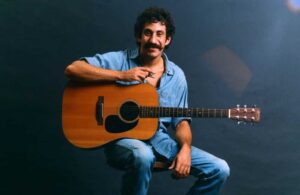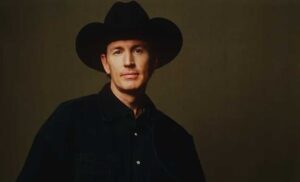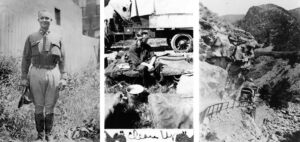In 1980, when the Motor Carrier Act deregulated the trucking industry, competition among carriers became fierce. But in spite of this “deregulation,” the federal government squeezed independent drivers with layer upon layer of regulations.
Perhaps not coincidentally, deregulation arrived at a time when truck driving and truck drivers had reached the height of their status as American cultural icons.
It’s almost as if the “outlaw” trucking songs of the previous decade — songs that helped drive public interest in trucking — fueled the government’s interest in making the industry less attractive, at least to entrepreneurial, independent-minded drivers.
So, what defines “outlaw” truck driving music? The answer probably lies with the drivers themselves.
Dave Dudley recorded “Six Days on the Road” in 1963, and the song set the stage for the outlaw subgenre of trucking music. Dudley’s lyrics reference speeding helped along by a “Georgia overdrive,” using “little white pills” to stay awake, dodging scales and being somewhat lax with the log book.
Even before environmentalism became a movement, “Six Days on the Road” took a slap at the future with its lyric, “There’s a flame from her stack, and that smoke’s been a blowing black as coal.” But the theme of Dudley’s song justified its means — it was the story of a truck driver rushing back home to his wife.
While “Six Days on the Road” offered references that could have turned the public against truck drivers, the song did just the opposite.
In fact, it helped establish truck driving as a decidedly American profession. Future trucking songs drew on rural values of country, freedom, self-responsibility, prosperity and maybe a little nonconformity. Truckers’ values closely related to the values held by many country music performers. And the country music establishment generally welcomed performers of truck-driving music — even the outlaw style — to its airwaves.
By the early 1970s, America took pride in the grit of its millions of truck drivers. But the decade held much more in store. The turbulence and violent protests of the ’60s had marked a change in America. While the truck-driving community took a far different approach to making its voice heard, drivers knew that nonconformity had a place in society.
Independent drivers went on strike twice during the decade, once in 1973 and again in 1979. In both cases, a major point was American’s energy policy and the high fuel prices that washed away drivers’ profits. And while it played only a small role in the shutdowns, the perceived overreaching of government at all levels further incensed those who drove trucks for a living.
Trucking music helped turn state and local police into villains — unrestrained lawmen who were hell-bent on making truckers’ lives difficult. It was a view of law enforcement that hit on all cylinders with almost anyone who ever received an unwarranted parking ticket. Trucking music capitalized on society’s sentiments.
Perhaps the most widely recognized outlaw trucking song came in the voice Rubber Duck, the fictional character immortalized in C.W. McCall’s novelty song “Convoy.” Not only did “Convoy” claim a spot among the top hits of 1976; but it also had something many novelty songs lack — staying power.
McCall referred to pretty much every inconvenience independent truck drivers despised. He vilified the national 55 mph speed limit, log books (or “swindle” sheets), weigh stations, overbearing authorities such as the Illinois National Guard, tolling stations and law enforcement in general.
“Rubber Duck,” “Pig-Pen,” “Sodbuster,” and “11 long-haired friends of Jesus” served as outlaws in the heroic sense of America. Likewise, they represented voices of unity among drivers. The legacy of “Convoy” included a sequel, a few more hits for C.W. McCall, a motion picture, unnecessary covers by other artists, enough CB radio sales to earn several startup tech companies millions, and relatively frequent airplay over four decades later.
“Convoy” may have set the standard for outlaw trucking music, but it was far from the only song of the ’70s that arose from a cultural phenom.
“Smokey and the Bandit,” the 1977 film starring Burt Reynolds and guitar picker Jerry Reed, not only focused on hauling illegal beer from Texarkana to Atlanta; it also highlighted efforts truck drivers’ efforts to speed the trip.
The movie made the CB radio craze even more popular as the truck driving Reed and interference-running Reynolds, along with a host of other supporting truckers, used the gadgets to dodge the law.
The most exciting scenes included hard-driving country music like “East Bound and Down,” a song that became the most notable from the movie’s soundtrack. Other songs and musical interludes, including “The Legend,” “West Bound and Down,” “March of the Rednecks” and “And the Fight Played On,” offered plenty of other outlaw-themed content to the truck driving genre.
Burt Reynolds’ CB handle was “Bandit,” after all.
A discography of 1970s outlaw trucking music hardly stops with songs that became or emerged from movies.
One-hit wonder Cledus Maggard and the Citizen’s Band recorded an album filled with outlaw trucking songs, the only notable one being “White Knight.” Although the song could fit into a couple of different trucking music subgenres, the title character is every bit an outlaw — albeit a bit of a bungling annoyance compared to the sophisticated C.W. McCall.
Some may argue that “White Knight” portrays the much despised “Smokey” as the intelligent character, and thus prevents the song from taking a spot in the outlaw category.
What other songs might be classified as “outlaw” when it comes to truck driving music? Merle Haggard’s “Movin’ On,” the theme of the briefly popular television show of the same name, focuses on the adventures of a pair of team drivers.
While S.S. Pruitt is an independent driver, the lyrics refer to him and his sidekick as “gypsies,” a derogatory name for people thought to be hustlers and criminals for centuries. Then again, considering the plot of the television show, the characters spend a lot more time dealing with side-story issues than they do keeping their eyes on the highway.
Finally, before closing the door on just a few of the great outlaw trucking songs that have been recorded, let’s turn back to the 1960s and another of Dave Dudley’s trucking hits — “Truck Drivin’ Son of a Gun.”
The narrator, on a run from New England to St. Louis, may not be in a hurry or dodging the weigh stations and the law. But he’s keeping busy engaging in behavior the average married woman would consider “outlaw.”
Dudley takes a tour of the eastern U.S. and tells us about cheating on every girlfriend he ever knew.
“I like my women everywhere I go,” he sings. Then he tells of no less than 11 stops he plans to make on his way to his “steady little baby waitin’ back home.” Dudley’s exploits with women make George Strait look like a choir boy when he sings of all the “Exes” he left in Texas.
Until next time, keep your outlaw attitudes; it helps keep the 1970s legacy alive. But try not to get too carried away. “Safety first” is the lyric all drivers should have on constant replay in their brains.
Since retiring from a career as an outdoor recreation professional from the State of Arkansas, Kris Rutherford has worked as a freelance writer and, with his wife, owns and publishes a small Northeast Texas newspaper, The Roxton Progress. Kris has worked as a ghostwriter and editor and has authored seven books of his own. He became interested in the trucking industry as a child in the 1970s when his family traveled the interstates twice a year between their home in Maine and their native Texas. He has been a classic country music enthusiast since the age of nine when he developed a special interest in trucking songs.














Gotta say Ronnie Milsaps” version of
“Prisoner Of The Highway” is top of the list material….
Won’t be no sleep for me tonight, no,
Gotta be hittin Tulsa by first morning light….